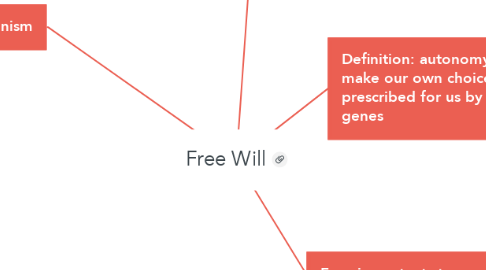
1. Determinism
1.1. everything in life is pre-determined
1.2. Implications:
1.2.1. theology/predeterminism
1.2.2. legally- what are we responsible for?
1.2.2.1. will come back to this below
1.3. Physical Determinism
1.3.1. all physical events occur as described by physical laws
1.3.1.1. there is only one possibility for the universe at a time in the future because physical laws determine how the universe proceeds
1.4. Genetic Determinism
1.4.1. Definition: human characteristics are strongly linked to certain genes
1.4.1.1. cannot help certain traits because genetic predisposition is inescapable
1.4.2. Strong Genetic Determinism- gene to trait mapping >95%
1.4.3. Moderate= >50%
1.4.4. Weak= <50%
1.4.5. GIFFORD
1.4.5.1. 1.) Differentiating factor= a trait is genetic if the genetics explain a difference in the population
1.4.5.1.1. heritability links and heritability problem (opposable thumbs not heritable), proposed solution is to expand population to include primates, making opposable thumbs heritable
1.4.5.2. 2.) Proper individuation (PI) Criterion= trait must be described so that the genes are the main (only?) cause of that trait
1.4.5.2.1. too ambiguous
1.4.5.2.2. doesn't differentiate gene/environment
1.4.5.2.3. for every study that finds a trait to be genetically caused there will be one to say it is epigenetically caused
1.4.6. Sarkar
1.4.6.1. the complexities between gene and environment make defining genetic trait in terms of cause a hopeless task
1.4.6.2. "genetic" if and only if:
1.4.6.2.1. 1.) trait is under control of few loci
1.4.6.2.2. 2.) the trait has high expressivity
1.4.6.2.3. 3.) the products of the genes play a role in the biochemical pathway that is related to the trait
1.4.6.3. due to discovery that many, many traits influence even simple traits (GWAS), this is an outdated approach that cannot work in modern biology
1.4.7. Kitcher
1.4.7.1. A trait is genetic if every organism in the species with the gene, has the trait regardless of the differing environments that the organisms maybe in
1.4.7.2. "gene for X"
1.4.7.2.1. if a substitution of that gene leads to a difference in the trait (x)
1.4.8. Kendler
1.4.8.1. built off of Kitcher's gene for x idea -> "X is a gene for Y" iff:
1.4.8.1.1. 1 strength of association
1.4.8.1.2. 2 specificity of relationship
1.4.8.1.3. 3 non contingency of the effect of X on Y
1.4.8.1.4. 4 causal proximity
1.4.8.1.5. 5 degree to which X can explain Y
1.4.8.2. if X has a strong and specific association with Y in all known environments and the physiological pathway is short and well understood then, and only then is it appropriate to speak of X as a gene for Y
1.4.8.3. cause for psychiatric disorders not genetic or even biological but psychological, social or legal
1.4.8.3.1. but no way to pick a single level for the explanation of a psychiatric disorder
1.4.9. All the above still FAIL to provide a relevant genetic characterization of behavior or psychiatric disorders
1.4.10. Waters
1.4.10.1. genes=actual difference makers, all other things are just conditions
1.4.10.1.1. genes are special compared to environment, epigenetics, development, other factors
1.4.10.2. X is the actual difference maker in Y iff:
1.4.10.2.1. 1 X causes Y
1.4.10.2.2. 2 the value of Y varies in a population
1.4.10.2.3. 3 X always causes Y even over large variability in the two variables
1.4.10.2.4. 4 variation in X fully accounts for variation in Y
1.4.10.3. critique: no way to find the ACTUAL difference maker among variables that all contribute
1.4.10.3.1. depends on what you are looking for/studying
1.4.10.3.2. also a circular argument, would need the actual difference maker
1.4.10.4. idea of potential difference maker
1.4.10.5. critique: still have trouble distinguishing cause vs. condition
1.4.10.6. Waters still provides us with a helpful advance in thinking about genetic determinism despite all the downfalls
1.4.11. Moral
1.4.11.1. moral responsibility called into question with human genome project?
1.4.11.1.1. not really, knowing the genome will not change how we delegate responsibility for actions----- this worry could be more relevant with more technology
1.4.12. Legal
1.4.12.1. Mobley case
1.4.12.2. some success in getting reduced sentences for genetic results that show certain mutations
1.4.13. We have all but given up on genes ~determining~ human behavior (singularly and explicitly)
1.4.13.1. of course genes ~contribute~ to behavior
1.4.13.2. recent turn to neurological and neuroscience causes of behavior
1.4.13.2.1. makes sense because genes + actions of environment + neural network = responsible for behavior
2. in order to make the case that genetic determinism exists almost completely yet there is still free will you need to turn to other sources for that ability to choose
2.1. how do we get the ability to choose?
2.1.1. where does that come from?
3. Definition: autonomy to make our own choices, not prescribed for us by our genes
4. Four important stances
4.1. + Determinism +Free Will
4.1.1. Compatibilism
4.2. + Determinism - Free Will
4.2.1. Hard Determinism
4.3. - Determinism + Free Will
4.3.1. Libertarianism
4.4. - Determinism - Free Will
4.4.1. Hard Incompatibilism
5. Harry Frankfurt: free action is ability to act upon second order desires as well as first order ones
5.1. (distinction from animals)
5.2. first-order desires
5.2.1. effective ones lead to action
5.2.2. noneffective does not motivate person to act
5.3. second-order desires
5.3.1. 1- simply to have the first order desire
5.3.2. 2- to have an ~effective~ first-order desire
5.3.2.1. aka volition
5.3.3. freedom of will is getting the will or self to match these second order volitions
5.3.3.1. to have the type of will that one wants to have
5.4. freedom of action is much weaker than freedom of will
5.5. moral responsibility: if agent has volition to act, even if they cannot act otherwise, they are responsible
5.5.1. Ex: willing drug addict is responsible, even if they are addicted
5.5.2. BUT unwilling drug addict is at the mercy of their condition- do not have free will
5.6. compatibilist
5.7. hierarchical approach to free will
5.7.1. digression to third-order desires

